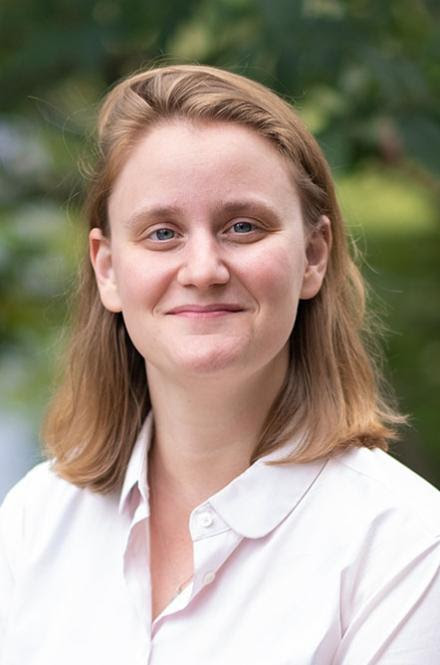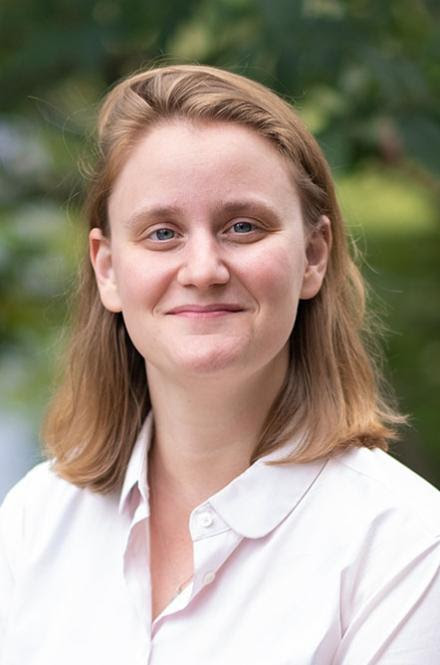I want to make room for complexity and nuance, to be flexible enough to change direction to meet the needs of everyone I serve, to assist in the building of connection and relationship, and to help people shift perspective in ways that can open up unexplored depths.
The first time I applied to the Reconstructionist Rabbinical College, I did not know any Hebrew. That is not an exaggeration. I applied in the winter, sent in all my transcripts, got my letters of recommendation, wrote a terrifying account of my life and only barely knew the aleph-bet. My plan was to go to Middlebury College to study Hebrew that summer so I could start school in the fall.
Wires got crossed, and I somehow thought the school was on board with this plan, only realizing my mistake when I showed up for placement testing the day before my interview. Cheryl Plumly, the admissions staff person, handed me the test and I looked at her, terrified, and said, “I don’t know Hebrew.” She smiled warmly at me and said, “Everyone says that. Don’t worry honey, you know more than you think you do.” I am sure this was true for 99 percent of the people that Cheryl had said it to, but it my case, my self-assessment was not the result of test panic or misplaced self-doubt. I had truly not taken a class. I didn’t want to disappoint this kind woman, so I sat in the basement of the library for two hours, not totally sure what to do, vaguely trying to sound out letters and wondering what lunch would be.
Ultimately, I received a very kind letter from Rabbi Amber Powers, the dean of admissions, who told me that RRC would love to have me as a student, but that I had to know something about Hebrew before being admitted and so would have to wait a year to start. So, I went to Middlebury and spent the next year immersing myself in the Jewish community. By the time I got to school, I could look up words and had memorized a short list of vocabulary, but had very little feel of how the language actually moved or played.
And so, when I began to study Biblical Hebrew with Dr. Tamar Kamionkowski, I was completely floored by how ambiguous and complex it is. During one lesson, Tamar demonstrated magically how the meaning of a sentence was completely transformed by a change in the way that a preposition was understood. I declared that day during my Mekhinah (Preparatory) year that I would give my senior Torah on prepositions. So here I am.
How much of a difference can transitional words really make?
Well, take this line from Leviticus: lo ta’amod al dam re’ekha. “Do not stand on your neighbor’s blood” (Leviticus 19:16). Is this about sneaker preservation or ethics? And if it’s about ethics, are we being instructed not to gain from our neighbors suffering or not to stand idly by while our neighbor suffers? All of these translations are technically correct: don’t stand in blood because that’s gross; don’t gain from the pain of others; and don’t be a bystander to wrongdoing. Depending on the reader’s perspective, one translation might be more relevant than the other. But it is because of the word al that there is such complexity in the sentence.
Or, in Genesis 1:4: vayar elohim et ha’or, ki tov — “God saw the light because it was good, or God saw the light, and it was good.” Depending on what you do with the word ki, this might be a self-affirmation on the part of God (“Good job, Me! This is nice.) or the basis of theology in which God can only see that which is good in the world.
These tiny words make all the difference. They remind us that fundamentalism is an act of choice that usually misses something significant — that there is more nuance, more mystery, more wonder in every line then we might initially think, and that a tiny shift in perspective can open up a whole world of possibility.
So when we only have access to a translation that flattens the meaning of the preposition, our view of the text has already been severely limited.
I had an idea of what senior Torah would be like. I did not imagine giving it like this. I had hoped to be in a room with all of you, soaking up the energy, savoring my last moments as a student the same way I use a spatula to eat every last bit of batter when I’m making brownies. But, here we are, on Zoom, simultaneously exhausted by the screen and exhilarated by the opportunity for connection.
Over my rabbinical student years, I have focused on learning how to treat the spiritual wounds of trauma. Thus far, I have learned from survivors of all sorts — from seniors nearing the end of their lives, from rabbis in the field [fn]Most notably Rabbis Julie Greenberg and Elisa Goldberg.[/fn] and from my own experience. Part way through rabbinical school, I managed to get Post-Traumatic Stress Disorder. Although I don’t recommend it, the process of getting and healing from PTSD has given me tremendous understanding, most significantly the following lesson: Humans have an incredible capacity for pain, for experiencing and healing from loss, for adapting to unthinkable circumstances.
We can survive agony. The thing that causes lasting, irreparable suffering is the inability to let go of expectations of what should have been. Managing the pain I felt from the trauma that caused my PTSD was nothing compared to the suffering caused by my internal insistence that I ought to be the same person I was before. My pain was prolonged and multiplied as I desperately attempted to be a version of myself that no longer existed. Being in the most painful part of my PTSD recovery was like reading a static translation of a changing text. So I have been learning to let go of what “should have been” and, instead, to experience the joy and sadness of what is.
Senior Torah is something we give le’kehilah, but instead of it being something I deliver to you (as a demonstration of my brilliance) as I always expected it would be, it is something I give for you — my love letter to this community, my attempt to express how much gratitude I feel for every moment I’ve spent over the last six years.
I am so proud to add RRC to the short list of places I am homesick for. Thank you for showing me the type of rabbi I want to be. There is a small part of me that came to rabbinical school because I cannot be on Broadway. It isn’t my favorite thing about myself, but there was some part of me that wanted to be a rabbi because I wanted to the star in the room. That is to say, I wanted to be a verb; setting the tone of the world around me, driving the action, switching binyanim (grammatical forms) depending on if a situation called for a causative rabbi or an intensifying rabbi or the ever elusive passive rabbi. I wanted to set the agenda.
And there have been moments over the past six years when I thought maybe I could be a noun — presenting a solid, certain theology, uncovering unmovable principles, a clergy person handing down the Absolute Truth.
But then I think back to my first classes in Mekhinah year, and I remember the feeling of awe as those prepositions opened up sentences to me, allowing them to speak in a language I could understand. I think about all the hours I spent debating with my hevruta (study partner) Bec over the meaning of a text, only to come to class and realize that we were both correct, but were responding to different nuances based on what was happening in each of our lives — nuances made possible by prepositions, which tell about relationship, space, time, method, cause and direction. These tiny words make all the difference.
I remember that, and realize that I do not want to be a verb or a noun. I want to be a preposition. I want to make room for complexity and nuance, to be flexible enough to change direction to meet the needs of everyone I serve, to assist in the building of connection and relationship, and to help people shift perspective in ways that can open up unexplored worlds.
RRC, you have taught me to be a prepositional rabbi, and I am so grateful.
This is based on a talk delivered remotely via Zoom to the RRC community in May 2020.

Rabbi Nora Woods serves as the Interfaith Chaplain of Bryn Mawr College, where she provides spiritual care for the campus community, supports religious life on campus and helps facilitate interfaith community-building. She was ordained at the Reconstructionist Rabbinical College in June 2020. She graduated with a B.A. in religion from Earlham College and received a certificate in Leading Spiritual Diversity in Higher Education from New York University’s Of Many Institute for Multifaith Leadership. From 2016-19, she served as the rabbinic intern and Jewish adviser for Bryn Mawr College Hillel.
Prior to coming to Bryn Mawr, she served as the rabbinic intern at Georgetown University. She has also been a T’ruah Fellow, working with survivors of human trafficking in New York City; and as a chaplain for seniors at the Abrahamson Center for Jewish Life in North Wales, Pa., and at Hebrew Senior Life in Boston.
Aside from issues of faith and identity, Rabbi Nora loves to talk about farming, musical theater and food. When not at work, she can often be found supporting the work of community organizers, watching sports and playing outside.







